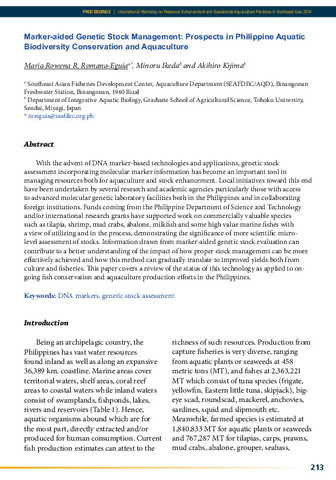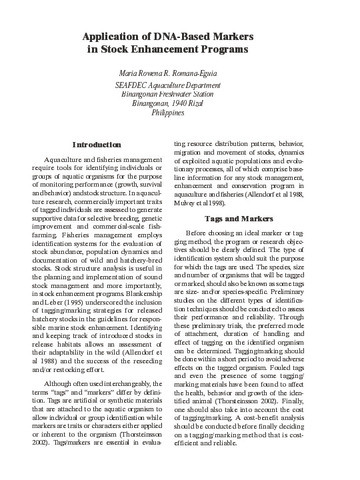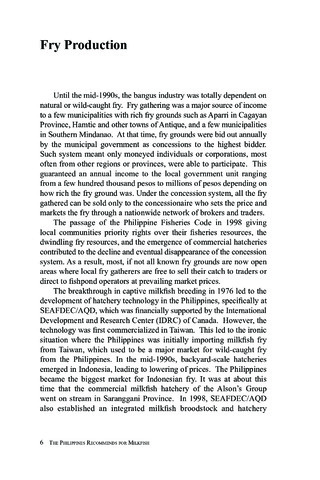Marker-aided genetic stock management: prospects in Philippine aquatic biodiversity conservation and aquaculture
| dc.contributor.author | Romana-Eguia, Maria Rowena R. | |
| dc.contributor.author | Ikeda, Minoru | |
| dc.contributor.author | Kijima, Akihiro | |
| dc.contributor.editor | Romana-Eguia, Maria Rowena R. | |
| dc.contributor.editor | Parado-Estepa, Fe D. | |
| dc.contributor.editor | Salayo, Nerissa D. | |
| dc.contributor.editor | Lebata-Ramos, Ma. Junemie Hazel | |
| dc.date.accessioned | 2016-01-19T10:02:59Z | |
| dc.date.available | 2016-01-19T10:02:59Z | |
| dc.date.issued | 2015 | |
| dc.identifier.citation | Romana-Eguia, M. R. R., Ikeda, M., & Kijima, A. (2015). Marker-aided genetic stock management: prospects in Philippine aquatic biodiversity conservation and aquaculture. In M. R. R. Romana-Eguia, F. D. Parado-Estepa, N. D. Salayo, & M. J. H. Lebata-Ramos (Eds.), Resource Enhancement and Sustainable Aquaculture Practices in Southeast Asia: Challenges in Responsible Production of Aquatic Species: Proceedings of the International Workshop on Resource Enhancement and Sustainable Aquaculture Practices in Southeast Asia 2014 (RESA) (pp. 213-222). Tigbauan, Iloilo, Philippines: Aquaculture Dept., Southeast Asian Fisheries Development Center. | en |
| dc.identifier.isbn | 9789719931041 | |
| dc.identifier.uri | http://hdl.handle.net/10862/2776 | |
| dc.description.abstract | With the advent of DNA marker-based technologies and applications, genetic stock assessment incorporating molecular marker information has become an important tool in managing resources both for aquaculture and stock enhancement. Local initiatives toward this end have been undertaken by several research and academic agencies particularly those with access to advanced molecular genetic laboratory facilities both in the Philippines and in collaborating foreign institutions. Funds coming from the Philippine Department of Science and Technology and/or international research grants have supported work on commercially valuable species such as tilapia, shrimp, mud crabs, abalone, milkfish and some high value marine fishes with a view of utilizing and in the process, demonstrating the significance of more scientific microlevel assessment of stocks. Information drawn from marker-aided genetic stock evaluation can contribute to a better understanding of the impact of how proper stock management can be more effectively achieved and how this method can gradually translate to improved yields both from culture and fisheries. This paper covers a review of the status of this technology as applied to ongoing fish conservation and aquaculture production efforts in the Philippines. | en |
| dc.language.iso | en | en |
| dc.publisher | Aquaculture Department, Southeast Asian Fisheries Development Center | en |
| dc.subject | DNA markers | en |
| dc.subject | Genetic stock assessment | en |
| dc.subject | Philippines | en |
| dc.title | Marker-aided genetic stock management: prospects in Philippine aquatic biodiversity conservation and aquaculture | en |
| dc.type | Conference paper | en |
| dc.citation.spage | 213 | |
| dc.citation.epage | 222 | |
| dc.citation.conferenceTitle | Resource Enhancement and Sustainable Aquaculture Practices in Southeast Asia: Challenges in Responsible Production of Aquatic Species: Proceedings of the International Workshop on Resource Enhancement and Sustainable Aquaculture Practices in Southeast Asia 2014 (RESA) | en |
| dc.subject.asfa | genetics | en |
| dc.subject.asfa | resource management | en |
| dc.subject.asfa | stocking (organisms) | en |
| dc.subject.asfa | aquaculture development | en |
| dc.subject.asfa | resource conservation | en |
| dc.subject.asfa | stock assessment | en |
| dc.subject.asfa | genetic markers | en |
| dc.subject.asfa | biodiversity | en |
| dc.subject.asfa | cultured organisms | en |






